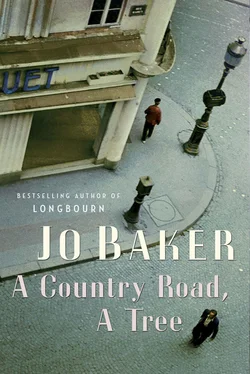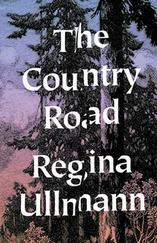Jean has a long moustache.
The dog stretches luxuriously, oblivious, and makes little happy groaning sounds. Outside, beyond the window, cicadas buzz.
Wound my heart with a monotonous languor.
And that’s it. His fingers dig into the upholstery. That is the line from Verlaine. That’s the message to the maquis that they are to begin combat operations. His skin bristles. Now it comes: the chaos of splintered timber and shattered brick and bursting shells and bullets and dust and blood and broken bodies. Liberation.
He finds that he’s on his feet, and that everyone is staring at him.
Suzanne looks up, her face grey.
His heart races. This is hope, he realizes, and it’s horrible. He sinks back into his seat. Hope implies the wire peeled back, and revelation: the crows in the woods, the fowls in the coop, the gamekeepers with their guns and chopping block — what they all will have become. The words continue from the radio, and he doesn’t know what to do with himself. His seat creaks, and the dog gets up and nudges her muzzle into his hand again, and he strokes her.
The broadcast over, Anna Beamish crosses to the radio set and turns it off, and the room falls entirely silent.
Then Anna says, “Well, that was illuminating.”
She lifts a bottle, ambles round, sloshes wine into glasses.
“So are you at liberty to tell us what that was all about, then, old top?”
“Hm?”
“What your keen ear detected there?”
Josette and Henri are looking towards him still, as is the other Suzanne. His Suzanne, though, is studying her shoes.
“Oh, nothing,” he says. “Nothing much at all.”
One of the dogs starts to whine, and there’s another sound beyond that. It takes a moment to notice, and, having noticed, to make sense of what they’re hearing. It’s an aeroplane — not close this time, way off across the valley. The engine noise gets louder, and then it begins to fade, without ever having got properly close at all.
“It’s like Piccadilly Circus round here,” says Henri, and Anna beams at him, proud of the vernacular.
“Well then,” Anna says. “We’ll drink to nothing, and wish you all the best of nothing, and swift success with nothing much at all.”
She raises her glass, her lips already stained with wine.
He drains his drink. He sets the glass down. Then he turns to Henri and Josette. “Could Suzanne come and stay with you for a few days?”
Suzanne speaks quietly, after their kind offers of hospitality. “Why would I go and stay anywhere?”
“You’d be very welcome here.” Anna leans in a little blearily, touches her knee. “We do have plenty of room.”
“Thank you, but I am quite all right at home.”
He says, “I don’t want to leave you on your own.”
She looks at him, finally. “Then don’t.”
—
A walk out through the gorgeous June night, out along the Apt road, his hastily packed bag hanging at his hip. Cigarettes, a box of matches, a notebook, a pencil and his fingerless gloves. He could probably have packed rather better for war: on reflection, these things do not seem to be particularly martial. He takes the lane that leads up across the hillside and fades to the path that skirts the dark house and garden. He reaches the gully and slithers in, barking an ankle on a rock. Blundering up the dry bed, he clatters over stones, lurching along, arms outstretched. It’s darker under the trees and the night see-saws around him. His head is not, perhaps, quite as clear as he had thought it.
He is stopped well before he reaches the camp, before he even reaches the bottom of the bluff, by a voice.
“Qui vive?”
“Violins?” he tries.
A shape steps forward from the side of a pine trunk. It’s the boy from the camp.
“I thought it would be you,” the boy says. “You sound like a herd of elephants. Keep the noise down, eh?”
Chastened, he passes by, catching the outdoor musk of campfire and unwashed body. He treads softly. And this, after all, is what must be done, so that the boy can get on one of those bikes and cycle home to his mammy and be a boy again, as though all of this was just a summer’s camp, a nonsense, and not a thing of life and death at all. And that too is hope.
CHAPTER SIXTEEN THE VAUCLUSE, Summer 1944
The crackling codes are conjured out of darkness by Bonhomme’s radio set, which he rigs up in someone’s attic or the back of a barn or workshop, or up amongst the trees, draping his aerial over the tiles or branches, and then packing it all away briskly and moving on.
The cell sets about making these words flesh.
Allied forces have landed in Normandy. This appears to be a truth. Not even the collaborationist papers and radio deny it. But, still, it is half a world away.
They walk the long country paths and the quiet roads at night. In June it never seems to be fully dark. They divide up ammunition and explosives, dig caches for their own gear, in the woods and in field margins and by the edge of the valley road. They lug the rest to the hidden camps across the countryside, to the forest clearings and exhausted quarries and caves high on the mountainside, where the lean men wait for them and nod approvingly over the new supplies.
There are supplies too for the thin, dark wives, the hungry children, the hard old folk. The families that the men have left behind.
The Allied forces land near Fréjus. It is not half a world away; it is a few hours’ drive from here.
Out in the field, everything becomes vivid, vital. He is ravenous at the offer of food, falls down dead and sleeps when provided with a bed or an approximation of a bed. He’ll sleep till the sun’s shining right on his face or someone shakes him awake. Then he pulls on his wrecked boots over his stinking socks and clambers out of whatever shelter it had been, at whatever time of night or day, and gets on with whatever he is required to do.
Because life is happening here, now, conspicuously, in the farmsteads and barns and in the woods and fields and gullies. The grass stretches itself towards the sun; vine tendrils curl themselves around their supports. Gunfire clatters. The birds are outraged at each other. Cows breathe sweetness, drip milk; lambs quiver and leap; and one lamb lolls, limp, head staved in and oozing. It roasts over the woodland fire and then is jointed into equal shares, its flesh fatty in the fingers and on the lips, becoming a darkness in the belly, and nausea. Heads start up at a hollow boom, and then another and another echoing out through the night. These are charges they supplied, dished out to another cell who are blowing up the railway line. They’re sending it sky-high.
Hope. He’s sick of it. Sick to the stomach of it. The wire is snipped though, bit by bit.
—
In the kitchen of the empty little house, he drinks water, cup after cup, poured from the sweating earthenware pitcher. In the jug it seems black as ink, but when he pours it it catches the light and twines and glimmers.
Through the night comes the distant sound of bombardment. And over to the south, the sky glows.
He finds a dry end of bread, dips a bit into his cup and gnaws at it awkwardly, trying to avoid the worst teeth, the ones that ache, the ones that sting, the one that now rocks in its socket. Outside, trucks go by, their low blackout headlamps skimming through the little room, their engines rattling.
He ducks down, out of the line of the window.
When he takes off his boots they have dried as stiff as wood. His socks stick to his skin. He knows he stinks. Sometimes he catches the smell of himself and it is raw and animal. Barefoot, footsore, he climbs the stairs to his empty bedroom and lies down on top of the covers. A slow blink. He is alone. A clattering of gunfire somewhere in the distance. A slow blink. His knees ache. His feet ache. Muscle softens against the mattress. A slow blink, and the lids flutter but do not lift. And the satisfaction of useful work, for once, undertaken; of something under way.
Читать дальше










